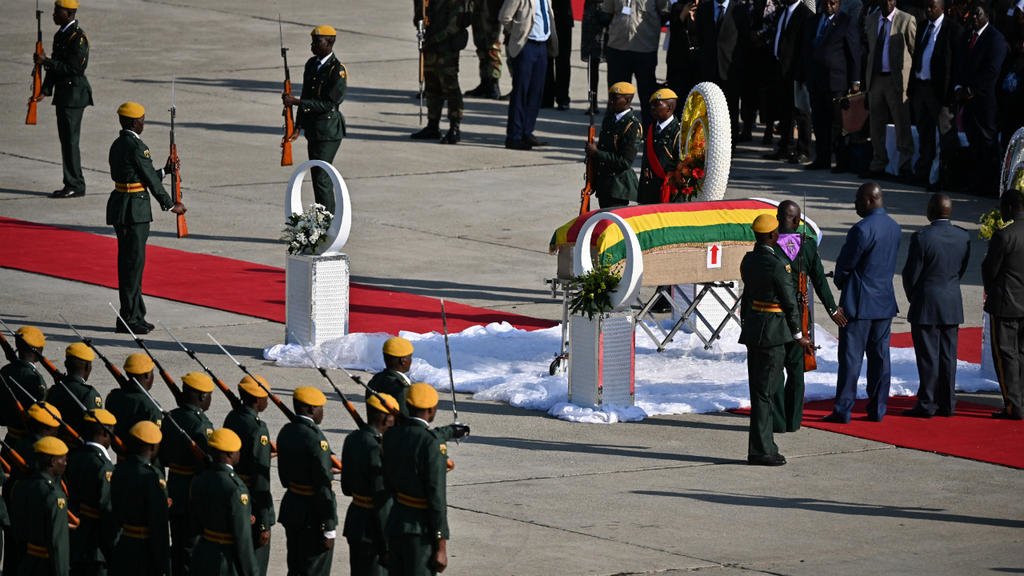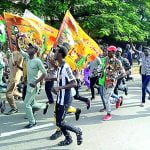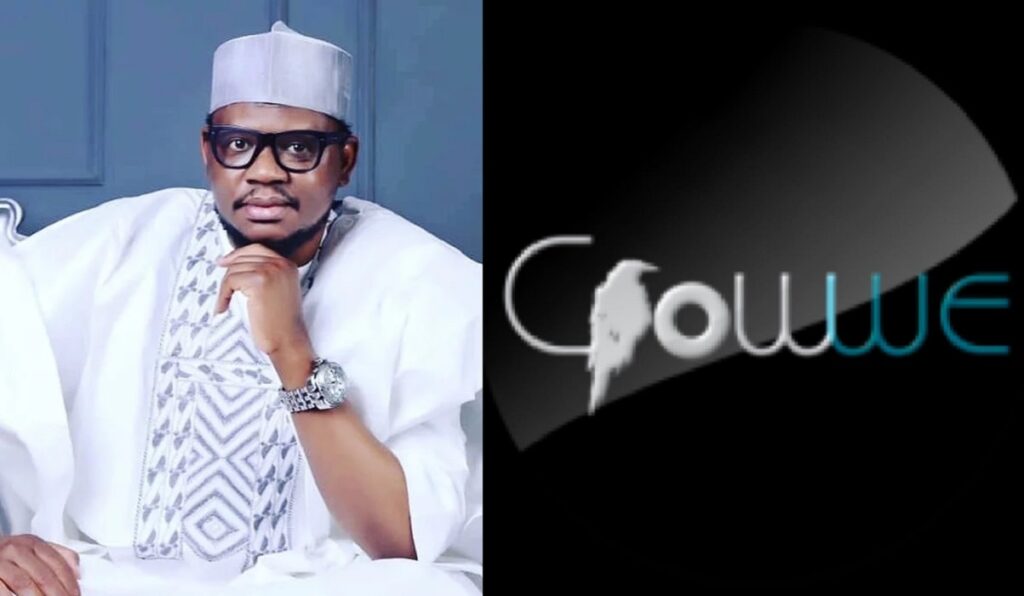The body of Zimbabwe’s ex-president, Robert Mugabe, arrived home on Wednesday to an honour guard in a country divided over the legacy of a former liberation hero whose 37-year rule was marked by repression and economic ruin.
Mugabe, a guerrilla leader who rose to power after Zimbabwe’s independence from Britain and governed until he was ousted by the military in 2017, died on Friday in Singapore, aged 95.
His health deteriorated after he was toppled by the army and former loyalists in November 2017, ending an increasingly iron-fisted rule during which he crushed his opponents.
Around two thousand supporters, family members and government officials were on the tarmac at Harare airport to welcome Mugabe’s remains as they arrived by charter flight from Singapore, an AFP reporter said.
Soldiers stood guard along a red carpet as military officers walked solemnly alongside the coffin drapped in the green, gold, black and red national flag.
Mugabe’s wife, Grace, wearing a black veil, sat with President Emmerson Mnangagwa as a military band played a gospel song.
“We are gathered here to receive our founding father of the nation…. an icon of Pan-Africanism, the man that created our nation,” Mnangagwa said.
“The light which led to independence is no more, but his works, his ideology will continue to guide this nation.”
Mugabe died on a medical trip to Singapore, where he had been travelling regularly for treatment. A delegation including Vice President Kembo Mohadi headed to the city-state on the chartered flight to bring him home.
The body will be taken to Mugabe’s private Harare residence, known as the Blue Roof, for the night.
It will be laid out for the public to pay their respects in Rufaro Stadium on Thursday, before heading to his homestead Zvimba for a wake.
Chinese President Xi Jinping, former Cuban leader Raul Castro and a dozen African presidents, including South Africa’s Cyril Ramaphosa, are among those expected to attend Mugabe’s state funeral on Saturday in Harare, Zimbabwe’s presidency said.
Mugabe’s final burial place on Sunday, though, is still unclear.
His family and President Emmerson Mnangagwa’s government are apparently at odds over whether it would be at his homestead northwest of Harare or at a shrine for liberation heroes in the capital.
Relatives have said that in line with native Shona customs, traditional chiefs from Zvimba will have a final say on where the former leader will be buried.
“If it has been decided by the chiefs, they have not told me,” his nephew Leo Mugabe told AFP. “The family and the chiefs will make the decisions.”
From hero to tyrant
At home, Zimbabweans have been divided over how to mourn a man once hailed for ridding the former British colony Rhodesia of the white-minority rule but who later purged his foes in a campaign of massacres and executions known as the Gukurahundi.
His increasingly tyrannical leadership and economic mismanagement prompted millions to flee a country crippled by hyperinflation and shortages of food, drugs and fuel.
Following his death, Mnangagwa announced Mugabe had been declared a “national hero”, flags flew at half-mast across Harare and news of his passing was splashed across newspaper front pages.
Yet Harare residents at the time appeared largely unconcerned, with shops remaining open and people going about their daily errands.
On Thursday and Friday, the body will lie in state at Rufaro Stadium in Mbare township in Harare for the public to pay their final respects. Officials plan to bus people in from the provinces to attend.
The 35,000-seat stadium is where Mugabe took his oath of office at a colourful ceremony when colonial Rhodesian Prime Minister Ian Smith handed over the reins of the country.
There Mugabe hoisted the new Zimbabwe flag and lit the independence flame on April 18, 1980 — bringing hope for a new era after a long guerrilla war.
The official funeral will take place on Saturday, at the giant 60,000-seat National Sports Stadium in Harare, where foreign leaders will attend.





2 Comments